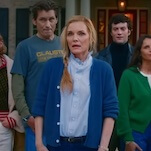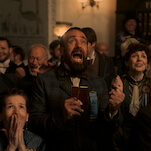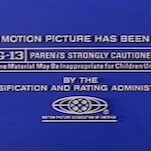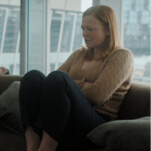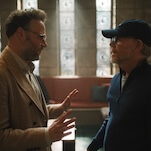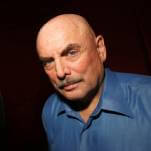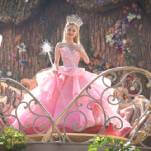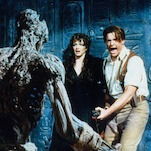The New Cult Canon: American Movie
"I
was called to the bathroom at the cemetery to take care of something. I walked
in the bathroom, and in the middle toilet right there… somebody didn't shit in the toilet, somebody shat on the toilet. They shat on the wall, they shat on the floor. I
had to clean it up, man, but before that, for about 10 to 15 seconds, I just
stared at somebody's shit. To be totally honest with you, it was a really,
really profound moment. Cause I was thinking, 'I'm 30 years old, and in about
10 seconds, I got to start cleaning up somebody's shit, man.'" —Mark Borchardt, American Movie
To
me, the monologue above, taken from the closing reel of Chris Smith's great
documentary American
Movie: The Making Of Northwestern, is in essence what the movie is all about. Yes, it's
an oft-hilarious look at the filmmaking process, following a Milwaukee-based
independent director of limited means (and perhaps limited ability) as he tries
to get a long-gestating personal project off the ground. And to that end, there
are countless insights into how difficult it is for creative outsiders to
realize their vision without the resources, access, education, and support that
give more privileged artists a leg up. But American Movie isn't about filmmaking per se, it's about the dreams and delusions
of a man who comes from blue-collar stock, but refuses at his peril to fall in
line with what's expected of him. After 10 seconds' reflection, Mark Borchardt
had to clean up somebody's shit in the cemetery bathroom, because he needed the
paycheck. But damned if anybody's gonna call him a janitor.
For
Borchardt, logging time working at a cemetery is apropos, since he began his
career at a cemetery drinking and shooting splatter shorts (with titles like
"The More The Scarier" and "The More The Scarier III") with his buddies. He'll surely want his tombstone to read, "Mark Borchardt, Filmmaker." He
talks—and oh, is Mark Borchardt ever a talker—about how his pragmatic father discouraged his filmmaking dreams when he was just 14, and offered up a host of possible alternate occupations, including
truck driver, police officer, electrician, and so on. And let's face it: When
you're a high-school dropout from Northwest Milwaukee and your only source of
financing is a cheapskate uncle languishing in trailer-park squalor, how many
options do you have? Especially when every utility and credit-card company is
threatening legal action on unpaid debts, and you have
alimony payments past due on three kids? At what point do you give up the dream
and start punching the clock?
For
Borchardt, that point will never come. In fact, since American Movie came out in 1999, he's continued plugging away at his dream, though his habit of not finishing what he's
started has brought only a few acting cameos and an upcoming feature (Scare Me) that's in a state of
half-completion. The subtitle of Smith's documentary, "The Making Of Northwestern," says it all, really:
Borchardt to this day has never finished his personal opus Northwestern, and Smith's film mostly
covers the permanent distraction of wrapping up "Coven" (pronounced COH-ven), a
16mm black-and-white horror short three years in the making. Though he is, in the words
of one "Coven" cast member, an "indomitable" figure who won't stop chasing that
rainbow, he's also a serious fuck-up who, for whatever reason (his debts, his
day jobs, his drinking, his depression), will always be swimming upstream.
American
Movie opens
with what will become a familiar image of Borchardt cruising the streets of
Milwaukee on a paper route, holding court on the Great American Script, the
Great American Movie, and his realization that it's important "not to drink and
dream, but rather create and complete." Easier said than done. Borchardt's
biggest problem is that his dreams are never tempered by the practical
realities of bringing them to life. He's ramping up to make a feature-length
16mm film with a script that isn't ready, a cast of amateurs that are butchering
his lines, unsecured locations, and worst of all, no money in the coffers. (His
sole investor, Uncle Bill, isn't an easy man to separate from his dough, even
in his clearly demented state.) The funny thing about the production meetings
for Northwestern is that Borchardt seems to
believe that just having them will somehow summon the movie into
existence. It says something about his collaborators' declining faith
that by the fourth meeting, it's only Borchardt and one other dude at the conference
table.
As Northwestern collapses, Borchardt turns
his attention to "Coven," which he hopes to finish after prying a few grand off
Uncle Bill. His unlikely scheme is to sell "Coven" on videotape to horror fans
at $14.95 a pop, and if he can find 3,000 buyers,
the profits can be poured into Northwestern. (Not surprisingly, the cult success of American Movie turned out to be a boon on
that front: According to the American Movie website, "Coven" has sold 5,137 units. Though even with that money and the $50,000 Uncle
Bill left his nephew to complete Northwestern, the film remains in indefinite limbo.) It's
here that we get a riotous look at what a Borchardt set is like, as in this
classic footage of a breakaway cupboard that won't break away:
Along
the way, we also get to know Borchardt's best friend Mike Schank, an amiable
burnout whose misadventures with drugs and alcohol have clearly left some
permanent wreckage in their wake. Schank mumbles on about how he and Borchardt
became friends because Borchardt was the only guy he knew who was willing to
come over and share a fifth of vodka. As the film opens, Schank has
finally gotten control of his drug and alcohol addiction—he
enthusiastically brandishes a can of Surge, a then-new Coke product—and
found another, slightly less punishing addiction in scratch-and-win lottery
tickets. The two make quite a pair: Borchardt the philosopher and soliloquist,
laying every thought out on the table, and Schank his amiable sounding board,
occasionally letting loose an odd, mirthless giggle. The one time we hear
Schank talk at length about anything, he gives a casual yet harrowing account of
a blackout that nearly killed him:






